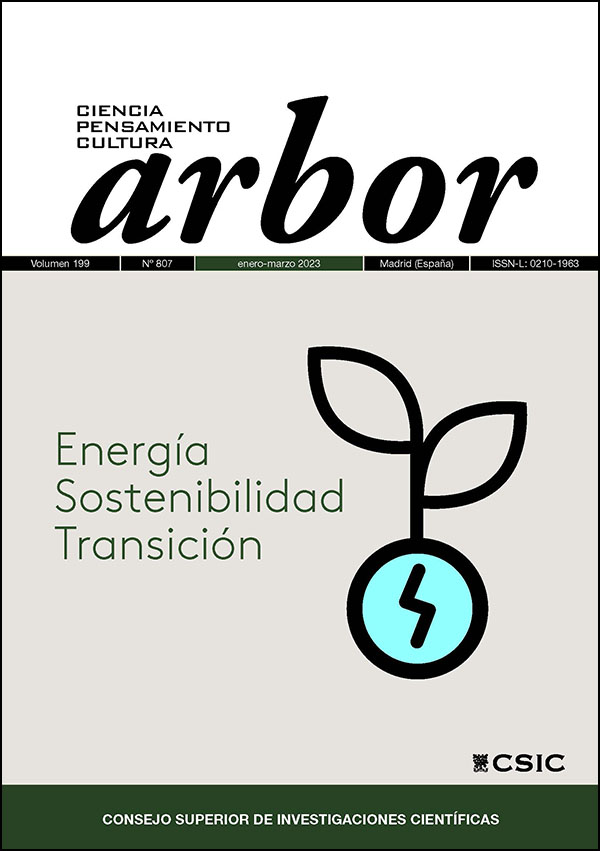Strategic differences among oil majors in the face of energy transition: options, motivations, and implications
DOI:
https://doi.org/10.3989/arbor.2023.807005Keywords:
Oil, majors, climate change, EuropeAbstract
This paper proposes a framework to analyse the strategic options of the oil majors in the face of the challenge from the energy transition, simultaneously considering two issues that are interrelated: the objective to reduce greenhouse gas emissions and the objective of adapting to changes that are occurring in the demand for energy. Using this framework, we wonder to what extent the changes taking place in the demand for energy have been a necessary, or even sufficient, condition for European companies to initiate diversification strategies. We also wonder if the diversification of the business towards other activities not linked to hydrocarbons has been a necessary condition, or a sufficient one, for these companies to have begun to take on the reduction of emissions as a strategic objective. Finally, the paper analyses the impact of these diversification strategies on the development of renewable energies.
Downloads
References
Bach, Matthew (2019). The oil and gas sector: from climate laggard to climate leader. Environmental Politics, 28:87-103. https://doi.org/10.1080/09644016.2019.1521911
Carbon Tracker Initiative (2022). Absolute Impact. Why Oil and Gas Companies Need Credible Plans to Meet Climate Targets. Carbon Tracker: Absolute Impact: Why Oil and Gas Companies Need Credible Plans to Meet Climate Targets - Carbon Tracker Initiative.
Christophers, Brett (2021). Fossilised Capital: Price and Profit in the Energy Transition. New Political Economy, 27:146-59. https://doi.org/10.1080/13563467.2021.1926957
Dietz, Simon; Gardiner, Dan; Jahn, Valentin y Noels, Joelien (2021). How ambitious are oil and gas companies' climate goals. Science, 374:405-8. https://doi.org/10.1126/science.abh0687 PMid:34672760
Du, Shuili y Vieria, Edward (2012). Striving for legitimacy through corporate social responsibility: insights from oil companies, Journal Business of Ethics, 110 (4). https://doi.org/10.1007/s10551-012-1490-4
Fattouh Bassam; Poudineh Ramatalah; West Rob (2019). The rise of renewables and energy transition: what adaptation strategy exists for oil companies and oil-exporting countries. Energy Transition, 3:45-58. https://doi.org/10.1007/s41825-019-00013-x
Grant, Andrew y Coffin, Mike (2020). How diverging oil and gas company strategies link to stranded asset risk, Carbon Tracker: https://carbontracker.org/reports/fault-lines/.
Grasso, Marco (2019). Oily politics: A critical assessment of the oil and gas industry's contribution to climate change. Energy Research & Social Science, 50:106-15. https://doi.org/10.1016/j.erss.2018.11.017
Green, Jessica; Hadden, Jennifer; Hale, Thomas; Mahdavi Paasha (2021). Transition, Hedge, or Resist? Understanding Political and Economic Behavior toward Decarbonization in the Oil and Gas Industry. Review of International Political Economy. https://doi.org/10.2139/ssrn.3694447
IEA-International Energy Agency (2020). The Oil and Gas Industry in Energy Transitions. Insight from IEA analysis. IEA: https://www.iea.org/reports/the-oil-and-gas-industry-in-energy-transitions. https://doi.org/10.1787/aef89fbd-en
IEA-International Energy Agency (2021a). The Future of Hydrogen Report prepared by the IEA for the G20, IEA: The_Future_of_Hydrogen.pdf
IEA-International Energy Agency (2021b). World Energy Outlook 2021. IEA: World Energy Outlook 2021 - Analysis - IEA.
IRENA (2021). International Oil Companies and the Energy Transition. Abu Dhabi: International Renewable Energy Agency.
Jaworska, Sylvia (2018). Change But no Climate Change: Discourses of Climate Change in Corporate Social Responsibility Reporting in the Oil Industry. International Journal of Business Communication, 55:194-219. https://doi.org/10.1177/2329488417753951
Kenner Dario y Heede, Richard (2021). White knights, or horsemen of the apocalypse? Prospects for Big Oil to align emissions with a 1.5°C pathway. Energy Research & Social Science, 79:102049. https://doi.org/10.1016/j.erss.2021.102049
Latapí, Mauricio; Johannsdottir, Lara; Davidsdottir, Brynhildur (2020). Drivers that motivate energy companies to be responsible. A systematic literature review of Corporate Social Responsibility in the energy sector, 247: 119094. https://doi.org/10.1016/j.jclepro.2019.119094
Li, Mei; Trencher, Gregory; Asuka, Jusan (2022). The clean energy claims of BP, Chevron, ExxonMobil and Shell: A mismatch between discourse, actions and investments. PLoSONE 17(2): e0263596. https://doi.org/10.1371/journal.pone.0263596 PMid:35171938
Lu, Hongfang; Guo, Lijun; Zhang, Yitong (2019). Oil and gas companies' low-carbon emission transition to integrated energy companies. Science Total Environment, 686:1202-9. https://doi.org/10.1016/j.scitotenv.2019.06.014 PMid:31412516
InfluenceMap (2019). Big Oil's Real Agenda on Climate Change: How the oil majors have spent $1bn since Paris on narrative capture and lobbying on climate. MapInfluence: https://influencemap.org/report/How-Big-Oil-Continues-to-Oppose-the-Paris-Agreement-38212275958aa21196dae3b76220bddc.
Mooney, Attracta (2020). How investor pressure prompted oil majors to wake up to climate change, Financial Times,www.ft.com/content/83b4ba6b-bef9-45d3-a6fb-087ef3143a43.
Pickl, Mathias (2019). The renewable energy strategies of oil majors-From oil to energy. Energy Strategy Reviews, 26:100370. https://doi.org/10.1016/j.esr.2019.100370
Sheehan, Kim (2018). This Ain't Your Daddy's Greenwashing: An Assessment of the American Petroleum Institute's Power Past Impossible Campaign: The Paris Agreement and Climate Justice. Intellectual Property and Clean Energy, :301-21. https://doi.org/10.1007/978-981-13-2155-9_11
Shojaeddini, Ensieh; Naimoli, Stephen; Ladislaw, Sarah; Bazilian, Morgan (2019). Oil and gas company strategies regarding the energy transition. Progress in Energy, 1:12001. https://doi.org/10.1088/2516-1083/ab2503
Skjarseth, Jon; Bang, Guri y Schreurs, Miranda (2013). Explaining growing climate policy differences between the European Union and the United States. GLOBAL ENVIRONMENTAL POLITICS 2013; 13 (4): 61-80. https://doi.org/10.1162/GLEP_a_00198
Van der Ploeg, Frederik (2016). Fossil fuel producers under threat. Oxford Centre for the Analysis of Resource Rich Economies, 32:206-22. https://doi.org/10.1093/oxrep/grw004
Published
How to Cite
Issue
Section
License
Copyright (c) 2023 Consejo Superior de Investigaciones Científicas (CSIC)

This work is licensed under a Creative Commons Attribution 4.0 International License.
© CSIC. Manuscripts published in both the printed and online versions of this Journal are the property of Consejo Superior de Investigaciones Científicas, and quoting this source is a requirement for any partial or full reproduction.All contents of this electronic edition, except where otherwise noted, are distributed under a “Creative Commons Attribution 4.0 International” (CC BY 4.0) License. You may read here the basic information and the legal text of the license. The indication of the CC BY 4.0 License must be expressly stated in this way when necessary.
Self-archiving in repositories, personal webpages or similar, of any version other than the published by the Editor, is not allowed.















